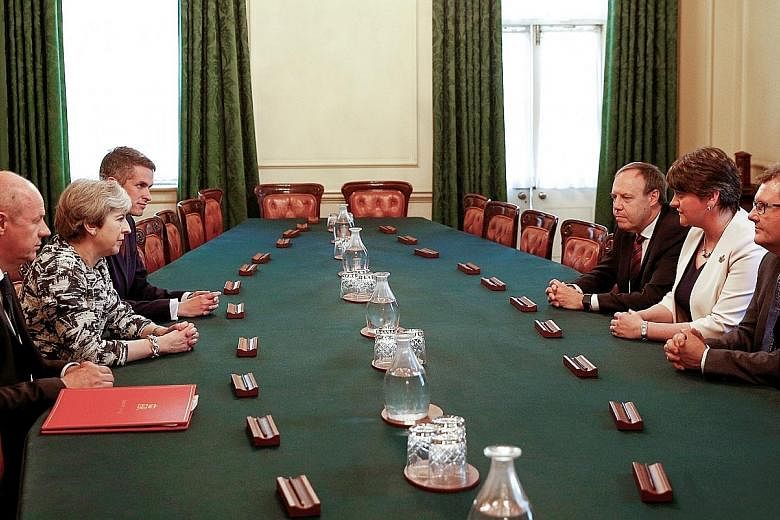LONDON • British Prime Minister Theresa May can now be sure her government can pass a budget and Brexit legislation, after her Conservative Party struck a deal yesterday with the biggest Protestant party in Northern Ireland, the Democratic Unionist Party (DUP).
The deal means the DUP's 10 lawmakers will now vote together with Mrs May's 318 Conservative MPs in the 650-seat Parliament on the legislative agenda, motions of confidence and Brexit.
The two parties promised to enforce it for the full length of the current parliamentary term, which is due to last until 2022.
But it is some way short of a more formal coalition agreement. Even with the DUP's lawmakers onside, Mrs May's effective majority is slim and her position remains insecure.
Mrs May's Brexit strategy is under scrutiny and her future as prime minister is the subject of public debate, with speculation that she could be challenged from within her own party within months.
Some in Mrs May's Conservative Party are unhappy at the deal, fearing it could imperil the 1998 peace settlement between Protestants and Catholics in Northern Ireland.
The DUP's rival, Irish nationalists Sinn Fein, also said the agreement - which would lead to at least £1 billion (S$1.7 billion) in extra funds for the British province - provides a "blank cheque" for a Brexit that threatens peace in Northern Ireland.
Sinn Fein president Gerry Adams said Mrs May's pledge to provide the funding through the province's power-sharing executive put pressure on the pro-British DUP and Sinn Fein to revive their compulsory coalition before a fresh deadline to do so elapses on Thursday.
"There is work to be done by the DUP and only limited time to do this," he said.
Opposition parties also swiftly criticised the agreement.
"This Tory-DUP deal is clearly not in the national interest but in May's party's interest to help her cling to power," Labour leader Jeremy Corbyn said.
"The government must immediately answer two questions. Where is the money for the Tory-DUP deal coming from? And, will all parts of the UK receive the much needed additional funding that Northern Ireland will get as part of the deal?"
Scottish and Welsh leaders have reacted furiously to the agreement, accusing Mrs May of weakening the ties of the UK by "throwing money" at the Northern Ireland party to prop up her minority government.
Leaders in Scotland and Wales also asserted that the move could compromise the make-up of the UK itself.
Wales' First Minister Carwyn Jones of the Labour Party said: "Today's deal represents a straight bung to keep a weak prime minister and a faltering government in office.
"It is outrageous that the Prime Minister believes she can secure her own political future by throwing money at Northern Ireland while completely ignoring the rest of the UK. It flies in the face of the commitment to build a more united country and further weakens the UK."
Downing Street has said there will be no knock-on funding boost for other parts of the UK through the Barnett Formula, the mechanism used to distribute central government funding to the devolved nations.
Scotland's First Minister Nicola Sturgeon said: "In concluding this grubby, shameless deal, the Tories have shown that they will stop at nothing to hold on to power - even sacrificing the very basic principles of devolution."
Ms Sturgeon, head of the Scottish National Party, added: "This deal also raises very serious questions for (Mrs May's) Scottish Secretary.
"At the weekend, David Mundell was indicating that he would not allow a situation where Northern Ireland received extra funding while Scotland did not."
But Professor Jonathan Tonge of the University of Liverpool, who co-authored a 2014 book on the DUP, said "the Conservatives simply had no choice".
"It's a very good deal for the DUP. £1 billion over two years, with the prospect of more cash if the deal is extended," he noted.
REUTERS, BLOOMBERG

